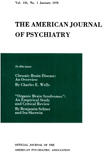PRELIMINARY REPORT ON THE USE OF METHYLENE BLUE TO TERMINATE AN ANTABUSE-ALCOHOL REACTION
Abstract
The reported ability of methylene blue to reactivate xanthine oxidase inhibited by antabuse in vitro has been tried clinically as a means of terminating an antabuse-alcohol reaction. Although there was some subjective relief in 2 patients following the intravenous injection of methylene blue, there was no objective evidence of its altering the antabuse-alcohol reaction in the amounts given. From these results, it seems unlikely that xanthine oxidase is of major importance in acetaldehyde metabolism in vivo; or else methylene blue in this dosage is unable to overcome the inhibition brought about by antabuse, if such an inhibition of xanthine oxidase occurs in the patient.
Access content
To read the fulltext, please use one of the options below to sign in or purchase access.- Personal login
- Institutional Login
- Sign in via OpenAthens
- Register for access
-
Please login/register if you wish to pair your device and check access availability.
Not a subscriber?
PsychiatryOnline subscription options offer access to the DSM-5 library, books, journals, CME, and patient resources. This all-in-one virtual library provides psychiatrists and mental health professionals with key resources for diagnosis, treatment, research, and professional development.
Need more help? PsychiatryOnline Customer Service may be reached by emailing [email protected] or by calling 800-368-5777 (in the U.S.) or 703-907-7322 (outside the U.S.).



